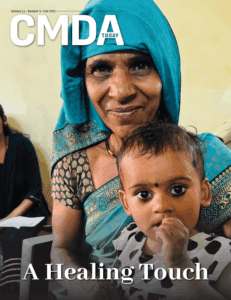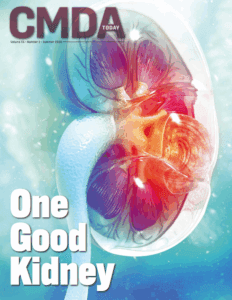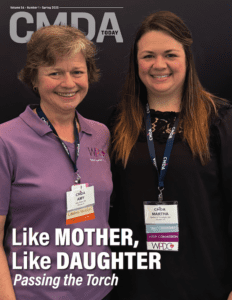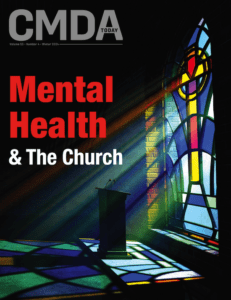Organized Medicine and the Response to Dobbs: Seeking Crucial and Constructive Conversations
On June 24, 2022, the U.S. Supreme Court handed down its decision in Dobbs v. Jackson Women’s Health Organization, a landmark decision in which the court held that the U.S. Constitution does not confer a right to abortion.[1] A number of medical professional organizations responded to the decision with public statements. These responses were framed
John D. Mellinger, MD, FACS
Prologue: The article below was first composed and submitted to one of the leading medical journals in summer 2022 following the U.S. Supreme Court’s decision in the case of Dobbs v. Jackson Women’s Health Organization. It was at that time titled “Nothing to Nuance: Organized Medicine’s Response to Dobbs.” It was prompted by the essentially uniform response of organized medicine, as reflected in our academic and professional societies as well as boards, in condemning the Dobbs decision and its consequences. The piece itself was an attempt to speak winsomely and humbly into that then evolving conversation from a sanctity of life perspective, hoping an editorial of this nature might open the door to a broadened and respectful dialogue with colleagues who did not share a biblical worldview. It was greeted by a rejection notice that came within 24 hours from the editorial staff of that journal. The themes raised came up in a recent discussion I had with CMDA CEO Dr. Mike Chupp. After reviewing, Dr. Chupp suggested we share it with the CMDA audience as one example of how we might seek to be winsome in appealing to our colleagues, and in promoting constructive dialogue in such areas of conscience and ethics in healthcare. I am sure many of our readers will have used similar or no doubt better “talking points” in their own work on these themes. I offer what follows to this audience not as a comprehensive or even adequate thesis, but hopefully as a stimulus to dialogue and thought around the theme of being prepared to “…give the reason for the hope that you have…with gentleness and respect…” (1 Peter 3:15), something this writer is still very much learning to do. I pray it might serve our members in their own conversations on issues of like importance.
On June 24, 2022, the U.S. Supreme Court handed down its decision in Dobbs v. Jackson Women’s Health Organization, a landmark decision in which the court held that the U.S. Constitution does not confer a right to abortion.[1] A number of medical professional organizations responded to the decision with public statements. These responses were framed around themes including affirmation of patient autonomy, protection of the doctor-patient relationship, preservation of abortion experience in the training environment and protection of disparately affected populations. On July 7, 2022, more than 75 organizations across the spectrum of medical specialties and their certifying boards issued a further joint statement reiterating similar concerns and positions.[2] The nearly universal voice of organized medicine as reflected in these statements was condemnatory of the court’s decision and its anticipated impact on abortion access, which was seen as a cornerstone of reproductive health service.
Several elements are absent from these statements. These include reference to the sanctity of life as a historically foundational value for the medical profession. Similarly absent is acknowledgment that a sizeable segment of the American population is, in fact, “pro-life” in its perspective. There is no related evidence of awareness of the non-inclusivity of these statements endeavoring to represent the voice of the profession on behalf of both patients and healthcare professionals. Finally, there is no reference to the possibility or potential merit of solutions other than abortion in the prevention and mitigation of unwanted pregnancy.
This viewpoint is offered in respect for our professional organizations and the significance of their collective voice, with whom, as reflected in these statements, I disagree. It is understood that our organizational leaders are acting in alignment with their own consciences and worldviews, and they care deeply about issues that are worthy of care. These include the impact of an unwanted pregnancy on the life of the mother and the related and all too typically disparate burden of care borne by the woman following the pregnancy. Issues of maternal and neonatal mortality are also high on their list of concerns, and these are indeed critical healthcare outcomes to be weighed. It was obviously such concerns, along with those highlighted in the statements themselves, that have prompted the collective house of organized medicine to speak as it has in near unison. My intent in sharing this viewpoint is accordingly not to critique or judge the motives of my colleagues, nor to dismiss the gravitas of the concerns they highlight. Rather, it is to ask for a deeper and more nuanced dialogue than we have, as reflected in these public statements, achieved.
This conversation is important for several reasons. The first pertains to the philosophic framing of the relationship between the healthcare professional and the stewardship of life. While there has been debate over the elements of the Hippocratic tradition that pertain to abortion and their application in both ancient and modern times, there can be little argument that a commitment to preserving rather than ending life was, until the last 75 years, a foundational value of the medical profession as enfranchised in its oaths and professional commitments. While the implications of the abandonment of that commitment (as reflected on themes including abortion and euthanasia) to the profession’s character and reputation may not yet be fully apparent, it does not seem out of order to recognize that it represents a significant shift.
A utilitarian and contractual, rather than sacred and covenantal, relationship between the healthcare professional and all life may seem a subtle nuance under the protection of a morally grounded society; however, in an era where moral knowledge is increasingly seen as uncertain if not unknowable, there may be more opportunistic and dangerous relativisms at hand. One doesn’t have to retreat to ancient times to see examples of what medicine can be not only complicit to, but participatory in, when some lives are deemed of lower status and value than others. Tuskegee, Nazi Germany and other examples come readily to mind. The present disparities in our system both nationally and globally make this a present and practical, rather than merely historical and theoretical, point of discussion. If all life is not to be valued and protected, the door is opened to deciding which lives in fact deserve the prioritized protection of the profession, and that seems a slippery slope for both patients and future healthcare professionals to walk upon. While colleagues may debate the reality of this threat, surely it can be agreed that it should not be ignored. Our own history as a profession entails that obligation, plus the recent and ongoing memory of its failures.
A second concern relates to the fact that we are rightly beginning to recognize the importance of having advocates within the profession who represent our patients’ diverse demographic and cultural backgrounds, while also understanding that the lack of this representation has relevance to patient outcomes. Current estimates by Gallup polls suggest that 39 percent of Americans self-identify as pro-life.[3] Is there any other demographic of that proportion that organized medicine would choose to uniformly ignore in its advocacy and policy-guiding statements? Surely there should not be, nor should it be ignored that that is precisely seems to have occurred in our recent statements. The point here is not that professional norms are up for popular vote as a proxy for principle; rather, the concern is that our professional house has found no room in which to acknowledge a substantial minority (and in some locales, a majority) of the populace we serve.
Additional concerns we will not have the space to herein develop include the fact that our appropriate and necessary spirit of non-judgment has seemingly devolved from the ethic of compassion and commitment to service for all into agnostic silence on issues of health relevance. The profession seems to increasingly be content to abrogate its opportunity to advocate for truly health protective and promoting options that could limit the need for abortion as a solution. Absent from the canon of statements offered are elements detailing the health, psychological and sexual implications of “hook up” culture and other contemporary expressions of liberated sexuality, consideration of adoption as a life-honoring vehicle for unwanted pregnancy and more. These are complex issues, but they are apparently non-issues as reflected in our professional statements, and that seems woefully inadequate if our goal is to truly promote health and thriving for future generations.
A final concern, and one that was expressed far more powerfully than this voice can muster, came from Mother Teresa in her address to the National Prayer Breakfast in 1994.[4] In that appeal, she outlines what can happen to the soul of a society that endorses violence as a preferred way to deal with the intrusions that life brings against our wishes, if not outside what our behaviors allow. She describes the violence of abortion and what it teaches society to allow in other contexts. In an era in which our society begs for healing from the ravages of violence on multiple fronts, not least including our political and policy discourse, it is hoped our profession can demonstrate an openness to nuanced conversation on complex themes and be of healing, rather than polarizing influence, going forward.
About the Author
John D. Mellinger, MD, FACS, is the current Vice President of the American Board of Surgery and Professor Emeritus of Surgery at Southern Illinois University School of Medicine. Dr. Mellinger practiced gastrointestinal and minimally invasive surgery for more than 30 years prior to his current duties. He has served as former president of the Association of Program Directors in Surgery and the Society of American Gastrointestinal and Endoscopic Surgeons, as well as a member of several national boards, including the American Board of Surgery (Chair, 2020 to 2021), the American Board of Family Medicine and CMDA’s Board of Trustees. Dr. Mellinger has also served as Academic Dean for CMDA’s Commission on Medical and Dental Education. He has received more than 30 teaching awards, including the CMDA Educator of the Year Award and two other national level educator awards. Dr. Mellinger and his wife Elaine have four children and 12 grandchildren.
Get Involved
As one of the core aspects of CMDA’s ministry efforts, CMDA is dedicated to serving as a Christian healthcare voice on issues like abortion, assisted suicide, conscience freedoms and more. We do that through our advocacy efforts on both state and federal levels. As a healthcare professional, your voice carries weight—and we need that weight and expertise as we stand together to bring the hope and healing of Christ to the world through advocacy. To learn more and get involved with CMDA’s advocacy efforts, visit cmda.org/advocacy.
[1] https://www.supremecourt.gov/opinions/21pdf/19-1392_6j37.pdf
[2] https://www.acog.org/news/news-releases/2022/07/more-than-75-health-care-organizations-release-joint-statement-in-opposition-to-legislative-interference#:~:text=%E2%80%9CAbortion%20care%20is%20safe%20and,of%20our%20health%20care%20infrastructure
[3] https://news.gallup.com/poll/393104/pro-choice-identification-rises-near-record-high.aspx
[4] https://www.americanrhetoric.com/speeches/motherteresanationalprayerbreakfast.htm#:~:text=I%20must%20be%20willing%20to,hurt%20Jesus%20to%20love%20us




